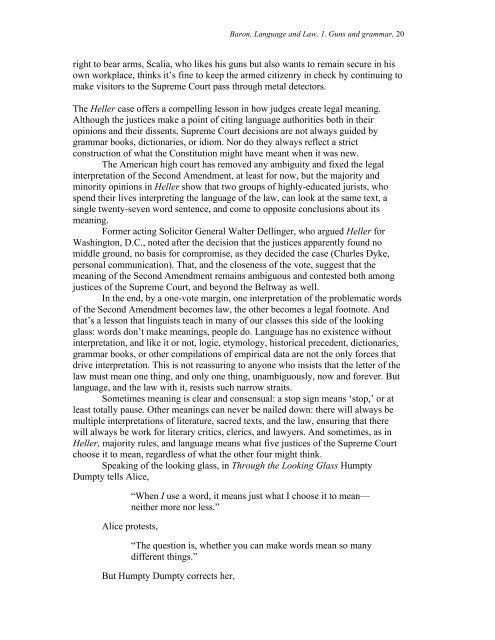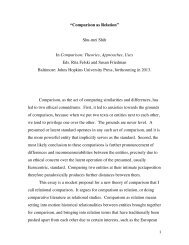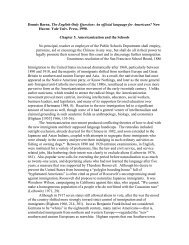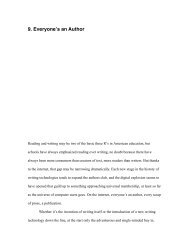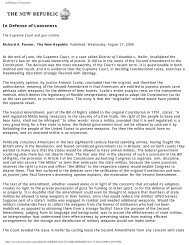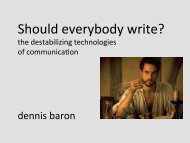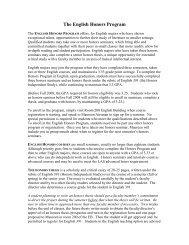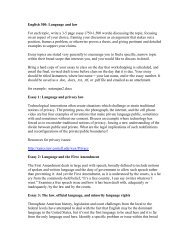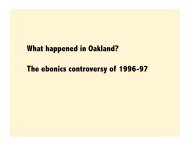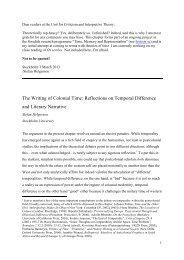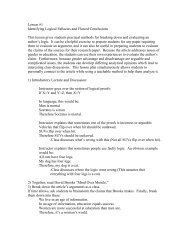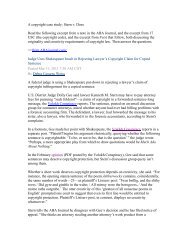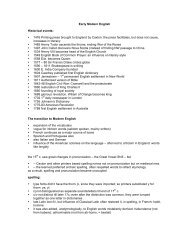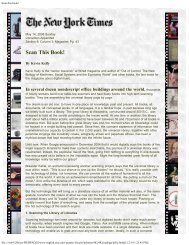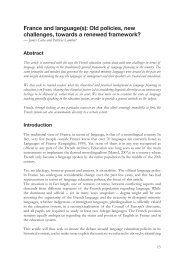1. Guns and Grammar: Determining what the Second ... - English
1. Guns and Grammar: Determining what the Second ... - English
1. Guns and Grammar: Determining what the Second ... - English
You also want an ePaper? Increase the reach of your titles
YUMPU automatically turns print PDFs into web optimized ePapers that Google loves.
Baron, Language <strong>and</strong> Law, <strong>1.</strong> <strong>Guns</strong> <strong>and</strong> grammar, 20right to bear arms, Scalia, who likes his guns but also wants to remain secure in hisown workplace, thinks it’s fine to keep <strong>the</strong> armed citizenry in check by continuing tomake visitors to <strong>the</strong> Supreme Court pass through metal detectors.The Heller case offers a compelling lesson in how judges create legal meaning.Although <strong>the</strong> justices make a point of citing language authorities both in <strong>the</strong>iropinions <strong>and</strong> <strong>the</strong>ir dissents, Supreme Court decisions are not always guided bygrammar books, dictionaries, or idiom. Nor do <strong>the</strong>y always reflect a strictconstruction of <strong>what</strong> <strong>the</strong> Constitution might have meant when it was new.The American high court has removed any ambiguity <strong>and</strong> fixed <strong>the</strong> legalinterpretation of <strong>the</strong> <strong>Second</strong> Amendment, at least for now, but <strong>the</strong> majority <strong>and</strong>minority opinions in Heller show that two groups of highly-educated jurists, whospend <strong>the</strong>ir lives interpreting <strong>the</strong> language of <strong>the</strong> law, can look at <strong>the</strong> same text, asingle twenty-seven word sentence, <strong>and</strong> come to opposite conclusions about itsmeaning.Former acting Solicitor General Walter Dellinger, who argued Heller forWashington, D.C., noted after <strong>the</strong> decision that <strong>the</strong> justices apparently found nomiddle ground, no basis for compromise, as <strong>the</strong>y decided <strong>the</strong> case (Charles Dyke,personal communication). That, <strong>and</strong> <strong>the</strong> closeness of <strong>the</strong> vote, suggest that <strong>the</strong>meaning of <strong>the</strong> <strong>Second</strong> Amendment remains ambiguous <strong>and</strong> contested both amongjustices of <strong>the</strong> Supreme Court, <strong>and</strong> beyond <strong>the</strong> Beltway as well.In <strong>the</strong> end, by a one-vote margin, one interpretation of <strong>the</strong> problematic wordsof <strong>the</strong> <strong>Second</strong> Amendment becomes law, <strong>the</strong> o<strong>the</strong>r becomes a legal footnote. Andthat’s a lesson that linguists teach in many of our classes this side of <strong>the</strong> lookingglass: words don’t make meanings, people do. Language has no existence withoutinterpretation, <strong>and</strong> like it or not, logic, etymology, historical precedent, dictionaries,grammar books, or o<strong>the</strong>r compilations of empirical data are not <strong>the</strong> only forces thatdrive interpretation. This is not reassuring to anyone who insists that <strong>the</strong> letter of <strong>the</strong>law must mean one thing, <strong>and</strong> only one thing, unambiguously, now <strong>and</strong> forever. Butlanguage, <strong>and</strong> <strong>the</strong> law with it, resists such narrow straits.Sometimes meaning is clear <strong>and</strong> consensual: a stop sign means ‘stop,’ or atleast totally pause. O<strong>the</strong>r meanings can never be nailed down: <strong>the</strong>re will always bemultiple interpretations of literature, sacred texts, <strong>and</strong> <strong>the</strong> law, ensuring that <strong>the</strong>rewill always be work for literary critics, clerics, <strong>and</strong> lawyers. And sometimes, as inHeller, majority rules, <strong>and</strong> language means <strong>what</strong> five justices of <strong>the</strong> Supreme Courtchoose it to mean, regardless of <strong>what</strong> <strong>the</strong> o<strong>the</strong>r four might think.Speaking of <strong>the</strong> looking glass, in Through <strong>the</strong> Looking Glass HumptyDumpty tells Alice,“When I use a word, it means just <strong>what</strong> I choose it to mean—nei<strong>the</strong>r more nor less.”Alice protests,“The question is, whe<strong>the</strong>r you can make words mean so manydifferent things.”But Humpty Dumpty corrects her,


